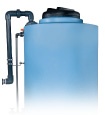Poly Processing is the leader in innovative chemical storage solutions, but our customers deserve even more. A quality product is only one important part of our service to you. We also take seriously our responsibility to equip our customers to be successful with the chemical storage solutions they purchase.
Topics:
Technology Tips
Coagulation is one of the preliminary steps in treating wastewater to make it safe for drinking. When chemicals are used, proper design and engineering of the storage tank can help ensure safety, longevity, and operational efficiency.
Topics:
Applications
Before you purchase a chemical storage tank, it’s important to know what kind of service to expect from the manufacturer — immediately and for years to come. You might have installation and startup needs, but you may also have questions about retrofitting a tank or installing new tanks. Many tank manufacturers don’t have a field service team or service department. Instead, they hire a local fix-it professional who isn’t familiar with their storage systems. Other times, you might have to find a service technician yourself. Poly Processing has our own on-site nationwide field service team that can service your PPC chemical storage tank at your facility. Let’s take a look at the types of on-site service our dedicated technicians are doing on a daily basis.
Topics:
Value Added
One of the most critical aspects of choosing and building a chemical storage tank system is tank design. Poly Processing makes this process as simple as possible for you by providing easy access to resources and several types of tank drawings.
Topics:
Technology Tips
Poly Processing has three strategically located manufacturing plants, headquartered in Monroe, Louisiana — with plants in Winchester, Virginia and French Camp, California as well. These locations give us the ability to easily transfer inventory and ship tanks to our customers throughout the United States.
Topics:
Installation and Field Service
At Poly Processing Company, we make it a top priority to ensure that you have all of the information needed to build a safe, reliable chemical storage system. That's why our complete digital product catalog is more than just a list of everything we offer. We've developed a catalog that is educational and a valuable resource for building a Poly Processing tank system that's right for your specific application. We're pleased to announce that we've updated our complete catalog with new content. The catalog includes 80 pages of chemical storage guidelines, Poly Processing Company tanks, tank accessories, custom fittings, and much more.
You need to know how much chemical is in your storage tank so you can order more product at the right time to continue business without missing a beat. Not only that, but certain chemicals have to be stored at specific levels to maintain their properties. Replacing the chemical too early or too late can stall your operations, ruin your inventory, and impact your profits.
If you aren’t increasing your chemical storage capacity, it might be time to reevaluate your storage strategy. Over the last couple of years, many Poly Processing customers have shifted their approach to storing chemicals. They are increasing their total volume capacity in response to many of the market’s trends. External factors, such as the war in Ukraine and supply chain issues, have a trickle-down effect that impacts companies that need to buy and store chemicals. These companies are discovering that it makes good business sense to upsize their chemical storage capacity — both from an operational perspective and a financial one. Should your facility increase your chemical storage capacity? Here are some compelling reasons it might make sense for you to upsize.
Topics:
Chemical Storage
When you design a chemical storage tank, it’s commonplace to request extra or "spare" fittings in the sidewall. These fittings aren’t designated for anything specific, but at some point you might need to add another accessory to the tank. It’s convenient to have that fitting already installed and ready to go. This is a common practice, but it’s a potentially hazardous one. Every time you penetrate the sidewall of a tank, you introduce another potential leak. Fittings have gaskets that need to be maintained and monitored for cracking. Over time, fittings and gaskets can degrade and require replacement. The fittings also need to have the proper torque on them for a proper seal.
Topics:
Fittings and Accessories
Poly Processing Company invites you to visit us at booth #2015 at WEFTEC 2022, October 10-12 in New Orleans, LA.
Topics:
News and Customer Stories



